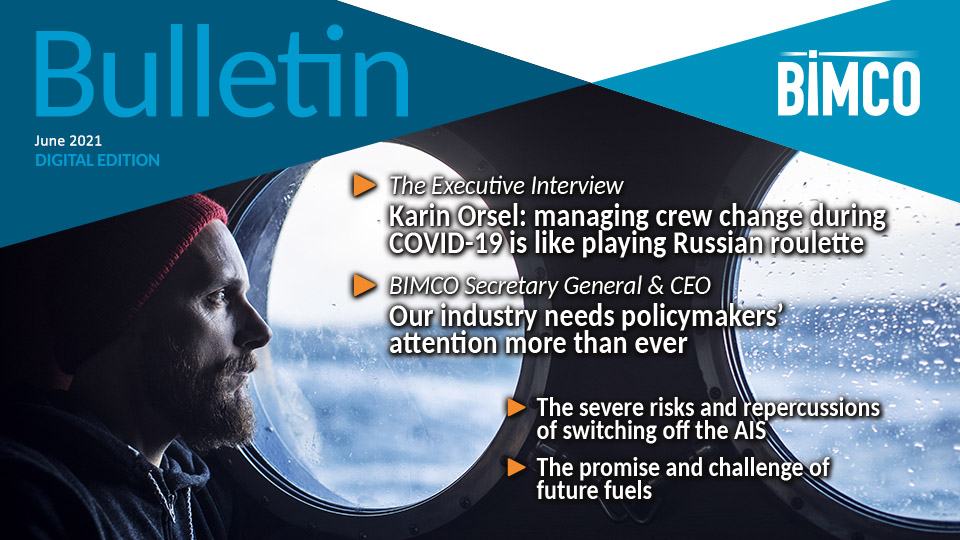BIMCO submits proposals to IMO to enhance exchange and harmonization of data
Overview
BIMCO has submitted two proposals to the International Maritime Organization (IMO) to pave the way for easy exchange of port logistic operational data and allow for real-time updates (notifications) between ship and shore.
Over the past years, BIMCO has continuously advocated for the establishment of a harmonised maritime data model, to allow easy transfer of electronic information between ship and shore (so-called machine to machine exchange).
The two proposals from BIMCO aim to reduce the administrative burden for the shipping industry, particularly when used in the context of the maritime single window, as well as to ensure better communication between ships, ports, terminals and all other parties involved through the harmonization of the data model used.
The maritime single window is a system that allows for the electronic exchange of information to assist ship clearance processes. Last year, the decision was taken to develop a prototype based on the maritime single window systems that had already been implemented in several member states.
IMO has recently updated (April 2019) the Facilitation Convention (the so-called FAL Compendium), which main objectives are to prevent unnecessary delays in maritime traffic, and to secure the highest practicable degree of uniformity in formalities prior to a port call. However, the update only represented a part of the information that is normally exchanged between the ship and shore in order to get clearance.
Based on an initiative by BIMCO, IMO agreed to establish an Expert Group on Data Harmonization to review data elements - within and beyond the IMO Facilitation (FAL) Convention - in order to develop a harmonized data model.
Ahead of the expert meeting in London in November 2019, BIMCO has submitted the two proposals containing amendments to the FAL Compendium. One proposal concerns a data model covering the Maritime Declaration of Health (MDH), according to the International Health Regulations (IHR). The other document provides a proposal to pave the way for easy exchange of port logistic operational data to allow for real-time updates (notifications) between ship and shore, which will make it possible to implement a Just-In-Time (JIT) approach.
The Just-in-Time concept refers to maintaining the most efficient ship operating voyage speed to arrive at the pilot boarding place when availability is ensured of the berth, fairway and nautical services.
Just-in-Time may be a tool to deliver enhanced port efficiency through “Smart steaming” instead of “slow steaming”, as each hour spent outside a port waiting to berth is a waste of efficiency and results in additional emissions.
All effects of additional slow steaming are gone if you lose the potential positive effects due to delays and congestion at a port.
The two proposals will be introduced at the Expert Group on Data Modelling (EGDM) at the IMO in London on 4-8 November.
For full details, please see the submission below.
Download RELATED Documents
-
EGDH 1-5 - IMO Data Set Related To The “Maritime Declaration Of Health” (BIMCO) 0.2 MB
Download now -
EGDH 1-7 - IMO Data Set Related To “Port Logistic Operational Data Related To Just In Time Concept” (BIMCO) 0.2 MB
Download now
Feedback or a question about this information?
VPS Bunker Alerts
Veritas Petroleum Services (VPS) publish regular Bunker Alerts based entirely on fuel samples and have kindly permitted BIMCO’s Members to access this information.
The Bunker Alerts are not intended to be an evaluation of overall bunker quality in the port or area concerned, but usually highlight a specific parameter within the fuel which has raised a quality issue.
Latest ice reports for members
Latest piracy reports
Latest industry releasable threats
ELSEWHERE ON BIMCO
Contracts & Clauses
All of BIMCO's most widely used contracts and clauses as well as advice on managing charters and business partners.
Learn about your cargo
For general guidance and information on cargo-related queries.
BIMCO Publications
Want to buy or download a BIMCO publication? Use the link to get access to the ballast water management guide, the ship master’s security manual and many other publications.
About a new business partner
We can help members check new business partners. We also help to recover millions of USD (undisputed) funds every year.





